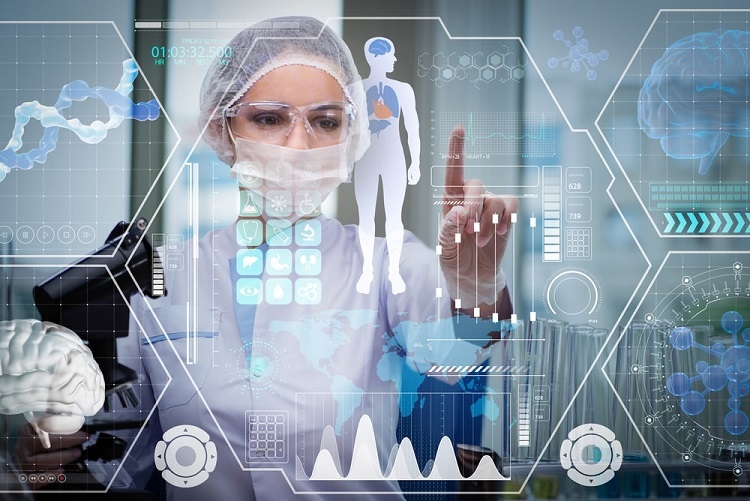Artificial intelligence in medical devices is a relatively new technology that is continually changing, and as a result, it is an undiscovered field that provides issues to regulatory authorities.
In medicine, artificial intelligence is the use of machine learning models to explore medical data and reveal insights that may enhance health outcomes and patient experiences. Artificial intelligence (AI) is increasingly becoming a vital aspect of modern healthcare, because to recent advancements in computer science and informatics. Artificial intelligence algorithms and other apps powered by AI are being used to assist medical practitioners in clinical settings and continuing research, as well as in other fields.
The difficulties that the COVID-19 pandemic has posed for many healthcare systems around the world have prompted many healthcare organizations to begin field-testing new artificial intelligence-supported technologies. It includes algorithms designed to assist in patient monitoring and AI-powered tools to screen for COVID-19.
There is still much more study to be done, as well as findings from these tests, and the overall guidelines for the use of artificial intelligence in medicine are still being developed. Despite this, the prospects for artificial intelligence to aid clinicians, researchers, and the patients they serve are continuously expanding. As of right now, there is little question that artificial intelligence will play an increasingly important role in the digital health systems that will shape and support modern medicine.
Table of Contents
Illness detection and diagnosis of artificial intelligence
Artificial Intelligence, in contrast to humans, does not require any rest. Critical care patients’ vital signs may be monitored by machine learning algorithms, which would notify clinicians if specific risk indicators increased. AI can collect data from medical equipment, such as heart monitors, and seek more complex illnesses like sepsis. One IBM customer has created a predictive Artificial Intelligence model that can detect serious sepsis in preterm newborns with a 75% accuracy rate.
Treatment of disease based on a patient’s genetic profile
Precision medicine may become easier to support because of the virtual artificial intelligence aid. Because AI models can learn and remember preferences, they can give patients personalized real-time recommendations anytime. Instead of repeating information with each patient, a healthcare system might provide patients with round-the-clock access to an artificial intelligence-powered virtual assistant who could answer queries depending on the patient’s medical history, preferences, and personal needs.
The application of artificial intelligence in medical imaging
Artificial intelligence is already playing a significant role in medical imaging. A growing body of evidence suggests that AI driven by artificial neural networks can be just as successful as human radiologists at detecting signs of breast cancer and other illnesses. Besides assisting clinicians in identifying early signs of disease, artificial intelligence (AI) has the potential to make the overwhelming number of medical images that clinicians must keep track of more manageable by identifying important pieces of a patient’s history and presenting them with the relevant images.
The effectiveness of clinical trials
During clinical trials, a significant amount of work is spent assigning medical codes to patient outcomes and maintaining the information. By enabling a faster and more intelligent search for medical codes, artificial intelligence can help expedite this procedure. Two IBM Watson Health clients recently discovered that by utilizing artificial intelligence, they could cut the number of medical code searches by over 70%.
Drug development at a faster pace
Drug discovery is frequently one of the most time-consuming and expensive phases of the drug development process. Artificial intelligence (AI) has the potential to lower the costs of producing new medications in several ways, the most significant of which include improving drug designs and discovering promising novel drug combinations. Many of the big data difficulties that the medical sciences industry is currently facing could be resolved using artificial intelligence.
Providing context-sensitive information
One significant advantage of deep learning is that artificial intelligence algorithms may use context to discern between different information, which is a significant advantage. Consider the following scenario: A patient’s clinical note includes a list of their current medications, along with a new medication that their provider recommends. A well-trained artificial intelligence algorithm can use natural language processing to determine which medications apply to the patient’s medical history.
Informed Patient Care
When medical artificial intelligence (AI) is integrated into clinician workflows, it can provide doctors with useful context as they are making care decisions. A trained machine learning algorithm can assist physicians in reducing research time by providing them with valuable search results that contain evidence-based insights on treatments and procedures while the patient is still there in the room with the clinician.
Error reduction is the goal
There is some evidence to suggest that artificial intelligence can assist in improving patient safety. A recent systematic assessment of 53 peer-reviewed papers investigating the impact of artificial intelligence on patient safety discovered that AI-powered decision assistance tools can aid in the improvement of error detection and medication administration.
Bringing the costs of care down
Using artificial intelligence (AI) has the potential to lower healthcare expenses in a variety of ways. A few of the most potential opportunities include lowering the incidence of pharmaceutical errors, providing personalized virtual health help, fraud prevention, as well as facilitating more effective administrative and clinical operations.
Increasing the level of doctor-patient interaction
Many patients are inquiring even after working hours. Chatbots, which can answer simple queries and offer patients resources when their provider’s office is closed. It provides round-the-clock care using artificial intelligence. Furthermore, artificial intelligence (AI) might be used to triage queries and highlight information for further study, which could assist doctors in identifying health changes that require additional attention.
Conclusion
The ability of artificial intelligence and machine learning in software to learn from real-world use and experience, as well as its ability to improve its performance, are the most significant advantages of this technology. The ability of artificial intelligence and machine learning software to learn from real-world feedback (training) and enhance its performance (adaptation) distinguishes these technologies from other software as medical device technologies.
The future of artificial intelligence and machine learning AI-based medical devices is exciting, but it necessitates a shift in viewpoint in order to maximize the safety and efficacy of AI in health care. It now presents substantial hurdles for both manufacturers and regulatory agencies, necessitating collaboration between them in order to develop integrated systems and a novel simplified way to regularizing such advanced technologies, both of which are currently in development.









